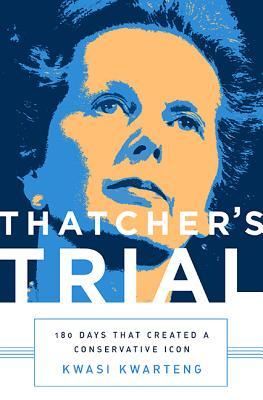
Thatcher's Trial
180 Days that Created a Conservative Icon
کتاب های مرتبط
- اطلاعات
- نقد و بررسی
- دیدگاه کاربران
نقد و بررسی

September 15, 2015
Britain's storied Iron Lady comes in for a largely positive but not uncritical reassessment from a Conservative Member of Parliament. Kwarteng (War and Gold: A Five-Hundred-Year History of Empires, Adventures, and Debt, 2014, etc.), who represents the historically conservative constituency of Spelthorne, may offend one or two die-hard admirers of Margaret Thatcher (1925-2013) with his careful qualifications: yes, she was a true-blue scourger of socialism and the welfare state, but she was defined by a largely negative program of what she was against. Yes, she had strongly held beliefs and remained true to her cause, but she was doctrinaire and an ideologue. More than anything else, she had an "almost preternatural ability to divide opinion," such that few were undecided or neutral on the matter of Margaret Thatcher. Much of Kwarteng's look at the end of Thatcher's first term in office is a balanced assessment. She was, more than any other prime minister in modern British history, open to discussion and even dissent on the part of her Cabinet, and she thrived on confrontation and debate-"provided, of course, that she prevailed." Occasionally, the author gives away more than he intends to: Thatcher, he writes, was a radical from the beginning, and her "quasi-revolutionary fervor" was deeply shocking to the established order on both left and right. One senses mild disapproval though not disavowal on Kwarteng's part as he steers the narrative through purges of that Cabinet and the government, union-busting and strike-breaking, dismantling of various parts of the social safety net, and neo-imperialist adventuring-all of which took place in the last part of 1982 and first part of 1983, when Thatcher would profoundly remake the Conservative Party and be rewarded for it with a sweeping re-election victory. Readers on this side of the pond who are puzzled by the impassioned esteem and disdain in which Thatcher is held in Britain will find much of value in this short but illuminating study.
COPYRIGHT(2015) Kirkus Reviews, ALL RIGHTS RESERVED.

October 15, 2015
Margaret Thatcher (1925-2013) is the only woman to have been elected prime minister of the UK, a position she held from 1979 to 1990. Kwarteng (War and Gold), a Conservative member of Parliament since 2010, offers a succinct, intriguing glimpse of Thatcher's leadership between March and September 1981, when the UK was beset by economic and social crises--inflation, unemployment, business closings, terrorism, labor strikes, and race riots--that nearly drove Thatcher and her party from office. The author focuses on how the prime minister responded to these challenges, as well as the allies and enemies that resulted from her uncompromising actions. During these months, "Thatcherism" became a recognized doctrine that promoted business, opposed government expansion, and was committed to law and order. Especially captivating are depictions of the emergence of the Social Democratic Party as an alternative to Thatcher's brand of conservatism, and of race riots in London and Liverpool. Kwarteng's portrayal of his subject is sympathetic, yet he does discuss her flaws, notably her intractable stances. VERDICT This lively account of Thatcher's bleakest days, before the 1982 Falklands War boosted her popularity, will appeal to general readers, historians, and political scientists, especially those who don't want to tackle Charles Moore's massive Margaret Thatcher. Kwarteng recommends Thatcher's memoir The Downing Street Years for her personal insights into this turbulent time.--Karl Helicher, Upper Merion Twp. Lib., King of Prussia, PA
Copyright 2015 Library Journal, LLC Used with permission.

























دیدگاه کاربران